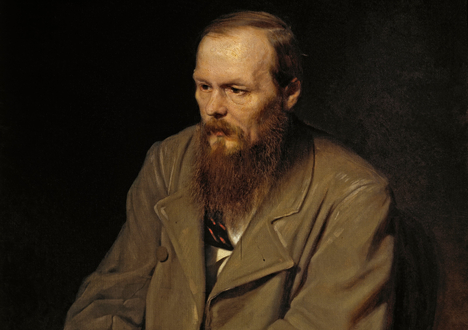Russian Literature: lost in translation en route to India

Indians are not really aware of what is happening in the Russian literary scene today.
Shutter Stock/Legion MediaThe Mumbai International Literary Festival, ‘TATA Literature Live!’ hosted at the National Centre for Performing Arts (NCPA), the city’s prominent hub of music, theatre and performing arts earlier this month, saw participation of authors from the United States, Australia, Canada, Britain, Egypt and Brazil. Russian writers, however, were not there.
In an interview with RIR on the sidelines of the festival, a prominent Indian novelist and playwright, Kiran Nagarkar recalled that when he was a child everyone in India gushed over Russian writers, especially children's books. “The main part was that they were very sensibly priced. I come from a very poor family, so I know, that time anyone could afford it,” Nagarkar said. “I don't know why this stopped completely. But if we are to learn what terrific writing is going on in Russia, the Russians should make some attempts to bring their authors across and introduce us to their work”.
Nayantara Sahgal, renowned author (and Jawaharlal Nehru's niece), admitted that people in India were not really aware of what is happening in the Russian literary scene today and said it would have been great if literary festivals in India started inviting Russian writers.
Anil Dharker, founder and director of the Mumbai International Literary Festival, said in a conversation with RIR, that they had requested the Russian Consulate in Mumbai for Russia's participation in the festival, but did not get any positive response. “But the offer is open for next year. Every year we keep adding more and more countries, and we will definitely go back to the Russian Consulate again,” he said.
Vladimir Dementiev, head of Russian Center for Science and Culture (RCSC) in Mumbai, told RIR he contacted the Union of Russian Writers regarding this invitation. The time, however, was very limited. “Our Indian colleagues were a bit too late in informing us about this event, I believe, since the financial planning in Russia is happening much in advance. Otherwise, I am sure that Russian writers are very much interested in establishing contacts with India and visiting this country,” Dementiev added.
With five branches in India, RCSC has been constantly conducting various cultural events, including literary ones. The anniversaries of renowned Russian classical authors like Sergey Yesenin, Anton Chekhov, Mikhail Sholokhov, Aleksandr Kuprin, Nikolai Ostrovsky and others are celebrated through lectures, exhibitions and literary readings, Dementiev said. Earlier this year Russian poet and writer Oleg Bushcko, the founder of “Pushkin in Britain” festival, visited India to participate in the Jaipur Literature Festival and conducted several lectures on Russian literature in Delhi.
However, literary events organized by RCSC often remain limited to the Russian expat community and scholars, students of Russian language as well as Russia's alumni while larger Indian population remains unaware about these numerous opportunities provided by Russian centres to learn about the past and present of Russia.
Now and then
While the names of Leo Tolstoy, Fyodor Dostoyevsky and Maxim Gorky are widely known in India, the names of contemporary writers such as Victor Pelevin, Lyudmila Ulitskaya, Boris Akunin, Vladimir Sorokin and many others are unlikely to ring a bell.
Natasha Perova, founder and editor of Glas, a Russian independent and non-profit publisher of contemporary fiction which has translated in English and published as many as 170 Russian authors believes the awareness about contemporary Russian literature in India has decreased since the collapse of Soviet Union.
“In Soviet times many Russian authors were available in India as it was largely supported and subsidized by government. We had a big team translating these books both in English and vernacular languages of India. But since 1991, this all has stopped,” said Perova, who was editor-in-chief of the Soviet Literature magazine English edition in 1980s.
She noted that some books published by Glas in the recent past are available in Indian universities with Russian studies departments. However, access to them remains limited to academia. Perova herself tried to offer Russian translations to Indian publishes about a decade ago, but did not get any positive feedback, she says. “I spoke to many prominent publishers but they were not really interested despite the fact that many Indian scholars have translations of Russian authors with them,” Perova told RIR.
Ranjana Saxena from Delhi University’s Slavonic & Finno-Ugrian Studies believes that if contemporary Russian literature is to become popular among mass readers in India, it has to be translated into vernacular languages, Hindi, Marathi, South Indian languages and Bengali, first. English reading audience, according to her, is limited.
However, she notes, publishing books without government support is difficult as publishers in India are not ready to invest money in names neither they nor the readers in India know. “Translation and publishing process is guarded by WTO and intellectual property rights, which implies large royalties to be payed for translations. Publishers are often reluctant to publish translations,” she said. “So it is a question of demand and supply. You cannot create demand unless people are aware about Russian literature, but they cannot be aware unless books are available”.
Opportunities for translators
There are presently few funds that support translation and publishing of Russian contemporary authors in foreign languages. Read Russia, a government initiative launched in 2012, is one of them. Through this, translators and publishers can receive grants from the Federal Agency for Press and Mass Communication (Rospechat) and the Institute for Literary Translation, an autonomous nonprofit organization, for translation of Russian literary works into foreign languages.
Transcript, a program of the Mikhail Prokhorov Foundation, a private charity, is another fund supporting translation of Russian contemporary Russian fiction, poetry and non-fiction since 2009. Some Indian publishers have applied and a few have received these grants.
Assam Book Hive received a grant for publishing Mandelstam's selected poems in English and Selected works by Anna Akhmatova in 2009. In 2013, Kalachuvadu Publications from India got a grant for publishing Dostoevsky’s ‘The Brothers Karamazov’ while Yatra Books received support for publishing the new translation of the ‘Indian fairy tales and legends, collected in Kumaon in 1875’ written by Russian Orientalist Ivan Minayev. The book, originally written in Russian in 1875, is now available in India under the title “Clever Wives and Happy Idiots: Folktales from the Kumaon Himalayas."
Dr. Akella Charumati Ramdas from English and Foreign Languages University (EFLU), Hyderabad, is among many scholars and translators who have been translating Russian contemporary authors into Indian languages. She has recently applied for grants to publish her Hindi translation of Roman Senchin novel The Yeltyshevs (2009) and the translation of Mikhail Bulgakov' s The Master and Margarita which she had completed back in 1998. Several other Indian translators have applied for grants for publishing of Dostoevsky and Chekhov in Indian languages.
“The schemes offered by Read Russia and the Mikhail Prokhorov Foundation are very lucrative for translators and publishers in India. However, such funds should support not only translation but also acquisition of rights, in case of modern literature, and publication costs, to make publishers in India really interested,” Ramdas added.
Saxena agrees that the copyright royalties contribute to the high costs of publishing. She has recently been given rights to translate “Voices from Chernobyl” by Svetlana Alexievich, who was awarded Nobel Prize for Literature this year, by the author herself. According to Saxena, Indian publishers are now keen to publish this book not only because the author is a Nobel laureate, but also because they do not have to pay for the rights which makes it much more affordable for publishers.
Svetlana Alexievich and several other prominent Russian writers visited India in 2008 on an invitation from the Indian Association of Teachers of Russian Language and Literature (INDAPRYAL).
All rights reserved by Rossiyskaya Gazeta.
Subscribe
to our newsletter!
Get the week's best stories straight to your inbox
